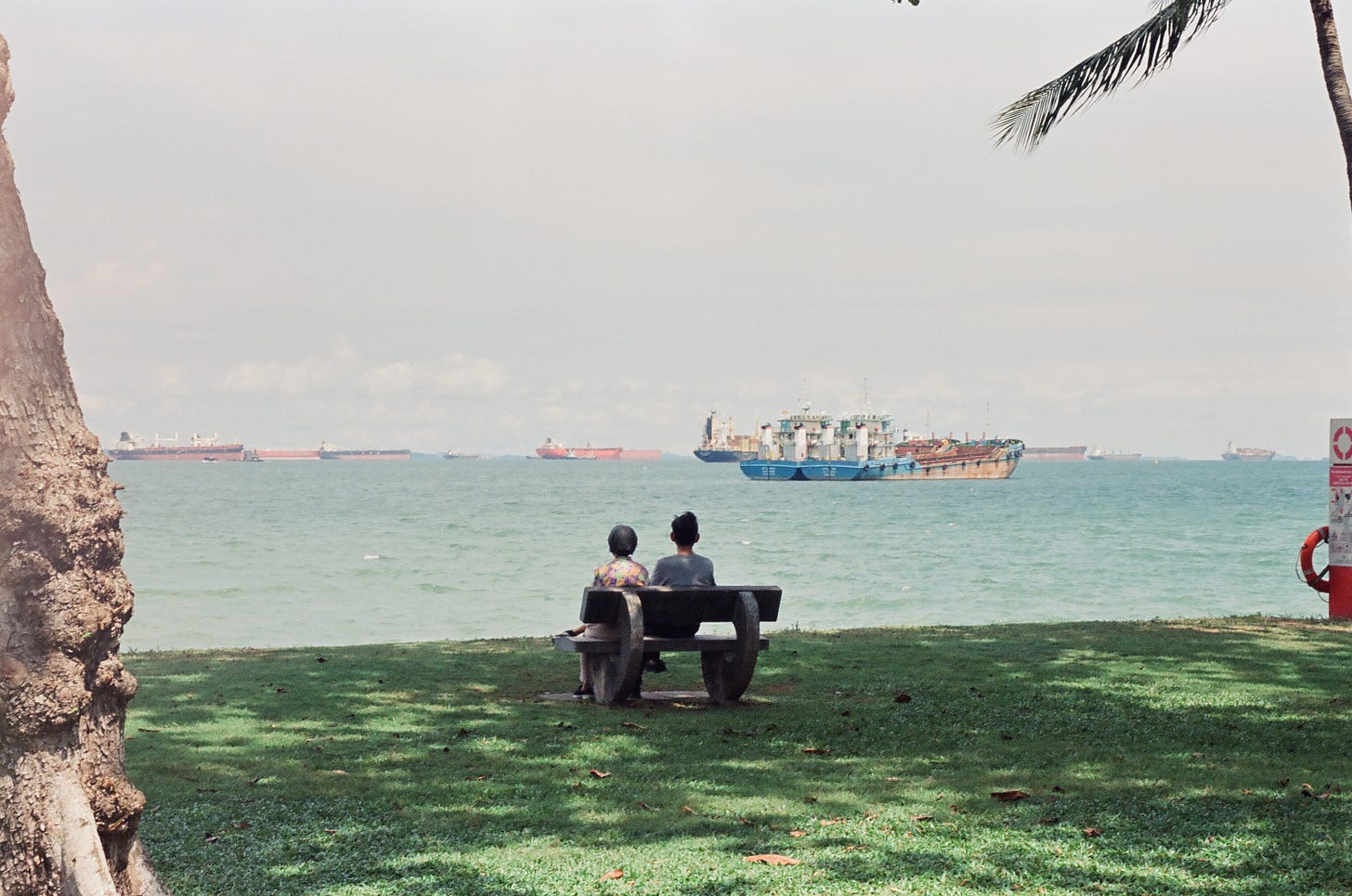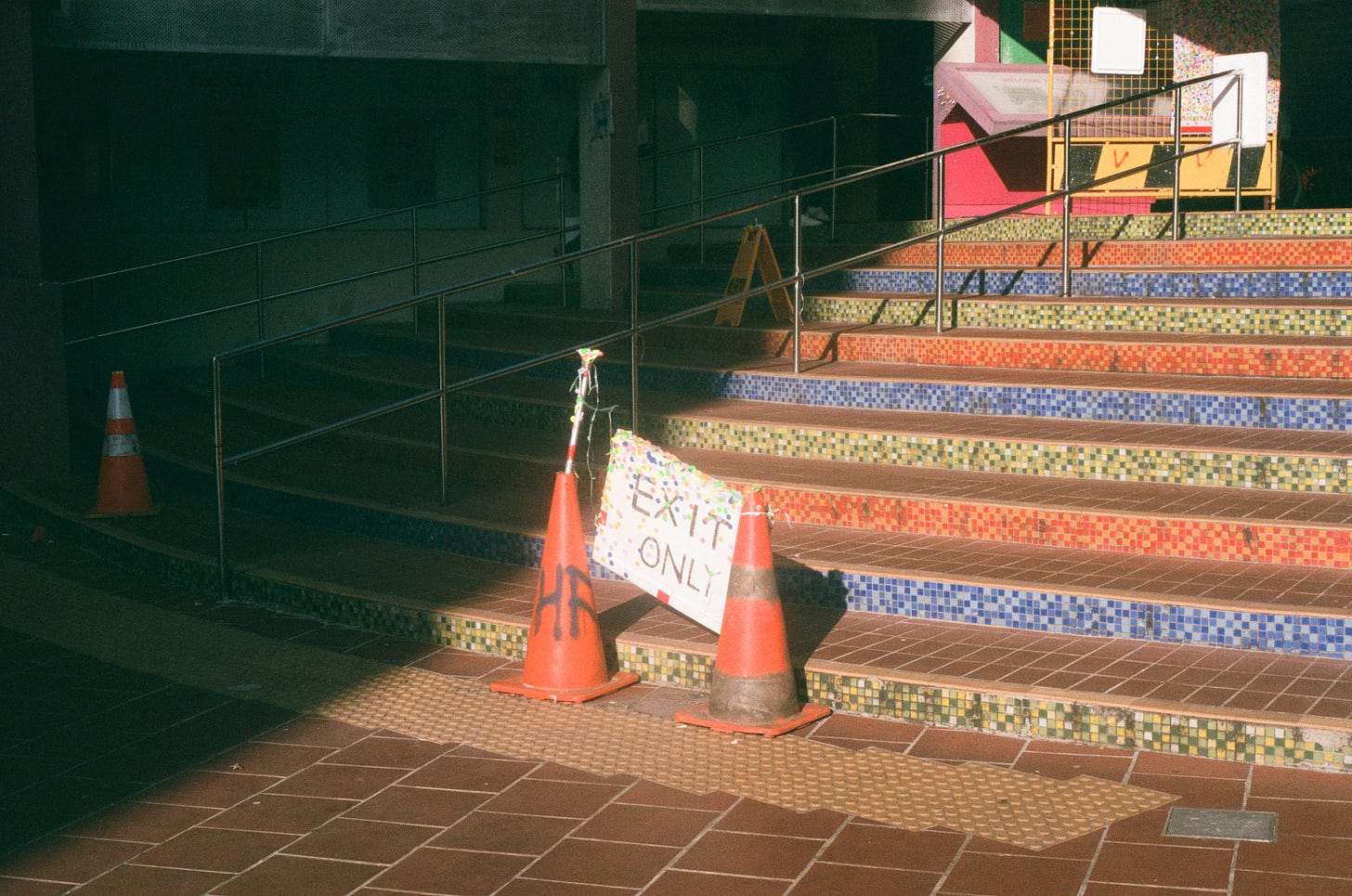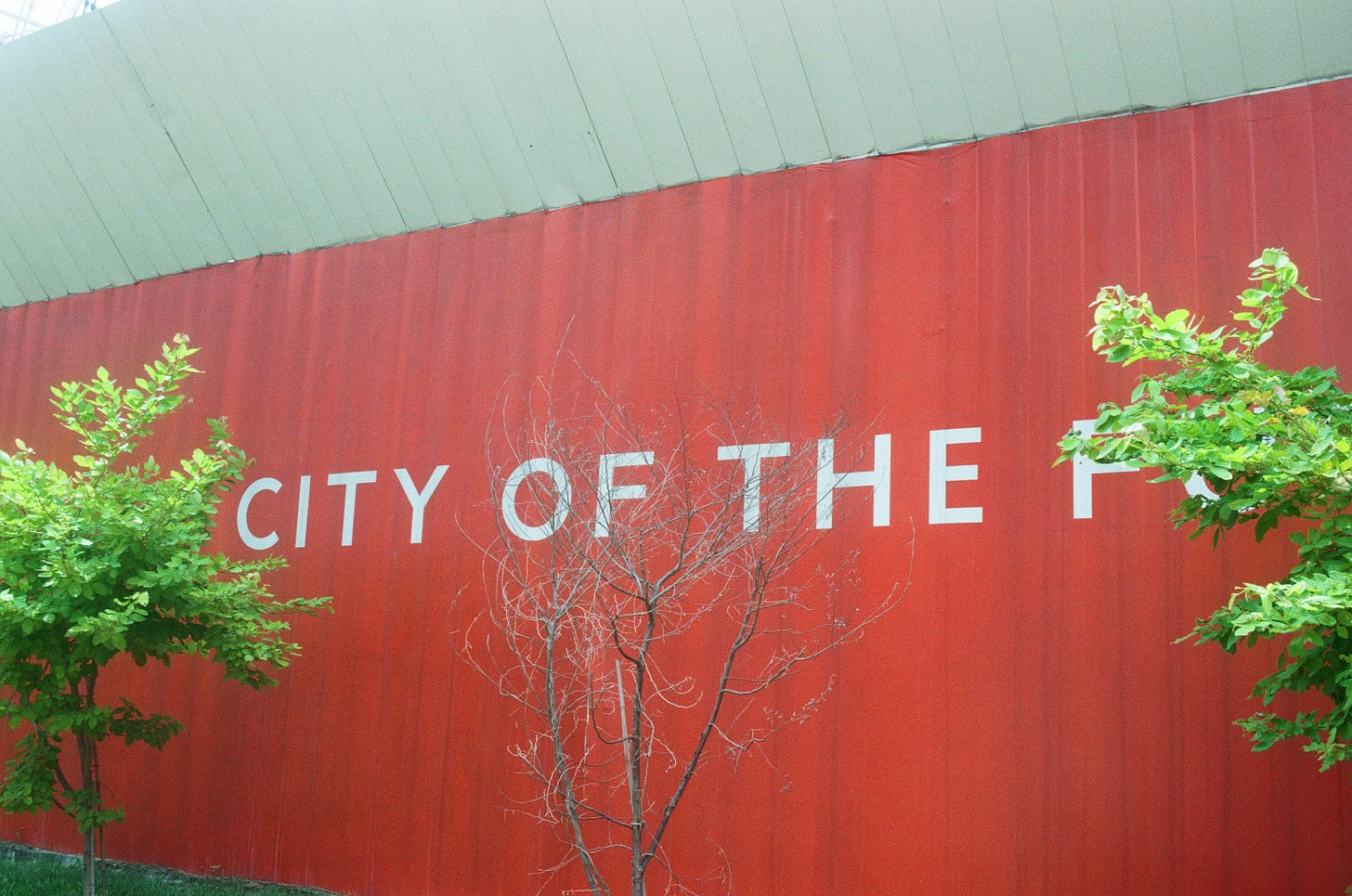(i) “as the common embrace”
In the trick of politics we are insufficient, scarce, waiting in pockets of resistance, in stairwells, in alleys, in vain. The false image and its critique threaten the common with democracy, which is only ever to come, so that one day, which is only never to come, we will be more than what we are. But we already are. We’re already here, moving. We’ve been around. We’re more than politics, more than settled, more than democratic. We surround democracy’s false image in order to unsettle it. Every time it tries to enclose us in a decision, we’re undecided. Every time it tries to represent our will, we’re unwilling. Every time it tries to take root, we’re gone (because we’re already here, moving). We ask and we tell and we cast the spell that we are under, which tells us what to do and how we shall be moved, here, where we dance the war of apposition. We’re in a trance that’s under and around us. We move through it and it moves with us, out beyond the settlements, out beyond the redevelopment, where black night is falling, where we hate to be alone, back inside to sleep till morning, drink till morning, plan till morning, as the common embrace, right inside, and around, in the surround.
— The Undercommons: Fugitive Planning & Black Study, Fred Morten and Stefano Harney, 2013
This morning I went down, unshowered and braless, to cast my vote. It was something to be done, like buying groceries, checking my mail or some other mundane task. But also it is supposed to be this big monumental thing only occurring every five years where there is some kind of possibility that things will might change. In my entire lifetime this would have been the fourth time, the third maybe? I cannot seem to remember exactly. At least the first two time, the sensation that something will shift felt palpable, and very real. But now, it’s rather diluted when my only choices (between two parties) has reached an ultimate moot point.
Contesting is a xenophobic party that claims that “this invasion by foreigners and immigrants” is hurting the workforce and to put a freeze or stop for the privileges given to those who considered to be lesser citizen. The tagline on the tiny boards being hung around my estate is “Take back what belongs to you”. And what is that exactly hun? And then we have PAP’s usual gang of Jalan Besar stronghold and safe to say, are as xenophobic, with a track record of calling migrants "walking time bombs and public disorder incidents waiting to happen" or claiming that “not a single migrant worker” trapped in shitty conditions of their dormitories during the pandemic lock-down asked for an apology, hell yeah no one forgets this shit. Authoritarian, fear-mongering, xenophobic party with the fattest paychecks stuffed down their pants.
Yet I am still humored by the performativity of the whole thing, bicycles cleared downstairs, a fan installed, a portable toilet that’s an ugly bright green placed in case someone has the urge to pee midway in a queue, maybe? The multi-purpose hall was repainted stark white, about three weeks ago, and wrapped around with blue and white barricade tape like a present waiting to be opened. The children here had to find other spots to play their evening-time football in case the space gets dirty again. On the day itself, I counted a total of 20 ushers all dressed in black, stationed every two meters, outnumbering the number of actual voters lining up that morning. Is all this for us, this spectacle of performative democracy. Everything seemed to be in running order on the surface, the superficial efficiency hides the rot and ruin beneath.
One of the women, a research participant involved in the study I've been conducting with the small department I work for, dropped me a call just a week ago. My daughter stole food from a boy in school she said, because I did not have enough pocket money to give her this week. She had moved her girls to a different school at the start of the year, and the registration for the pocket money support program her girls were in have closed. Can the school do something about it? I asked. They are not helpful, she said, and I am so tired asking here and there and getting nothing. Another woman drops me a text to inform me her financial assistance appeal has been rejected for the second time. The reason given was that her salary was too high. It’s strange, she texted, my current salary is smaller than what I was getting in my previous job and I still managed to get financial support.
Another woman informed me last month that she only received $100 because she applied with her husband after recently remarrying. I thought we’d get more since we now have four mouths to feed rather than three and my girls are here more often than before but they found out he was working adhoc jobs and say that $100 is just enough and the $600 from the months before was way too much now. They are so strict now, says another woman from months back. I’ve stopped going because they ask you to show everything, your bank account, your son’s bank account, your grandfather bank account, everything lah even five extra cents coming from somewhere also will be an issue. No point lah, no point.
Another woman had her Ebike confiscated because the police told her she made modifications to it. I never use my bike for anything, it is my rice bowl, my only source of income, she shared asking for resources to access immediate financial support. I could not provide her with anything because everything made available requires some vetting, on a case by case basis, and that takes time which many encountering these various crises in their lives are starved of.
My heart protests each time, beats with rage and helplessness, fists raised only to be faced with nowhere and nothing. I wonder how the election makes them feel, all these women I’ve encountered over and over in these last few months telling the same kind of story in different ways. My colleague shares that one of her research participants worry that by voting opposition, they may find out and take away her current financial support. Another woman told me she has no time for politics because she is too occupied with surviving each day.
These stories gather and disperse, without any ground to hold them up together. The only thing that stands true from them if they were allowed to chorus and be amplified is that the system is failing and falling apart. And yet it is there I find what Teo You Yenn describes as potential beauty1, that lives to live on, no matter, that somehow something deeper and more meaningful finds its way. Don’t get me wrong, this is not some poverty porn rising up to some social mobility ladder completely freed from poverty bullshit. Instead, here the beauty lies in the kindness between strangers, in the sprawling support of mutual aid, in refusing together by staying together, as the common embrace.
(ii) “…if they lead to maroonage”
Policy is not the one against the many, the cynical against the romantic, or the pragmatic against the principled. It is simply baseless vision, woven into settler’s fabric. It is against all conservation, all rest, all gathering, cooking, drinking and smoking if they lead to maroonage. Policy’s vision is to break it up then fix it, move it along by fixing it, manufacture ambition and give it to your children. Policy’s hope is that there will be more policy, more participation, more change. But there is also a danger in all this participation, a danger of crisis.
When those who plan together start to participate without first being fixed, this leads to crisis. Participation without fully entering the blinding light of this dim enlightenment, without fully functioning families and financial responsibility, without respect for the rule of law, without distance and irony, without submission to the rule of expertise; participation that is too loud, too fat, too loving, too full, too flowing, too dread; this leads to crisis. People are in crisis. Economies are in crisis. We are facing an unprecedented crisis, a crisis of participation, a crisis of faith. Is there any hope?
— The Undercommons: Fugitive Planning & Black Study, Fred Morten and Stefano Harney, 2013
The results came in as we slept, my daughter, my partner and I. Was I surprised that PAP still won by such a large margin? Not really. Unlike five years ago, my body no longer protests. Don’t get me wrong. The last nine days, I too have watched passionate individuals from several opposition parties make rousing calls to action demanding for better policies to narrow the income gap and overcome the high cost of living. Yet what we are truly fighting for are more seats on the table of a rigged game that has been played with the same dirty strategies for years. Potential leaders with actual heart are shot down over and over, some bankrupted all the way to their graves for trying to fight against actual injustices.
The fear myth is large and monstrous for it is fed and is reproduced across generations. The PAP calls upon that fear, summons it and its power to dispossess us into believing that weakness and disunity (their words not mine) is capable of burning all of what we have to the ground and then it will be our faults and we have to live with the most potent of the myth, the possibility of a future in despair is scarier than what we are encountering with how the current state of affairs is unfolding. Yes read that again many times over and make it make sense.
As the country (ok, ok some of us at least) mourns, my partner and I talked about feelings of hopelessness, not over the results but this prickly realization that injustices continue beyond the ballot box, beyond the speeches, beyond elections and the groundswell will not be as massive. As we navigate finding the words for our frustrations, he told me what he learnt over the last few months organising for Palestine is that finding openings through the cracks and slippages is the only way through. I’ve seen it too so many times in the precarious lives of my research participants. And beyond all that, they too find their own ways outside of the system.
The system is designed to fail those who needs it most so the lot of us can continue thriving I guess. Sure policies are created to protect the status quo and only the status quo and everything along the margins get left behind or put on hold. It is against all conservation, all rest, all gathering, cooking, drinking and smoking if they lead to maroonage. Is it even possible to maroon ourselves outside of it and fight for what we truly desire. I think of the people who have been doing the constant work to abolish the death penalty, to stop transporting migrant workers on the back of lorries and better laws for migrant workers, to simply be able to talk about the injustices of the genocide in Palestine, to gather fearlessly even with the risk of repercussions and the public’s outcries against them. How and where else can we find ourselves in the undercommons, in the heartbreak of failed democracy and a failing system, in the slippages…I truly am unsure but I hope to see you there.
(iii) “…but listen”
Here they meet those others who dwell in a different compulsion, in the same debt, a distance, forgetting, remembered again but only after. These other ones carry bags of newspaper clippings, or sit at the end of the bar, or stand at the stove cooking, or sit on a box at the newsstand, or speak through bars, or speak in tongues. These other ones have a passion to tell you what they have found, and they are surprised you want to listen, even though they’ve been expecting you. Sometimes the story is not clear, or it starts in a whisper. It goes around again but listen, it is funny again, every time. This knowledge has been degraded, and the research rejected. They can’t get access to books, and no one will publish them. Policy has concluded they are conspiratorial, heretical, criminal, amateur. Policy says they can’t handle debt and will never get credit. But if you listen to them they will tell you: we will not handle credit, and we cannot handle debt, debt flows through us, and there’s no time to tell you everything, so much bad debt, so much to forget and remember again. But if we listen to them they will say: come let’s plan something together. And that’s what we’re going to do. We’re telling all of you but we’re not telling anyone else
— The Undercommons: Fugitive Planning & Black Study, Fred Morten and Stefano Harney, 2013
Thank you for reading this far. May we keep finding our many shapes of protests and find each other as fugitives, marooned. Hydrate, ressociate and stay in love. <3
“We make meaning through our everyday lives--in small activities and through relationships. These are moments of potential beauty. They are the acts that make us human. The inclination by class-privileged women and men to reject the domestic realm because we see and know that it is the sphere of less power--it is an inclination that gives up too much and we must claw it back. In the process, we must also work to expand the space for everyone to meet their needs--make real choices, partake in the mundane, live lives, be human. To do this, we need reasonable employment conditions across the class spectrum and social policies that are not class-biased but genuinely supportive of all families.
No one should have to be super in order to be human.”







